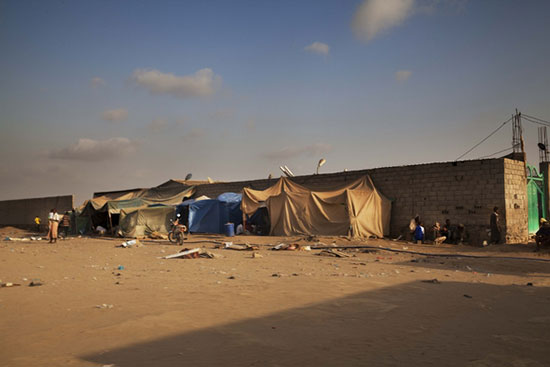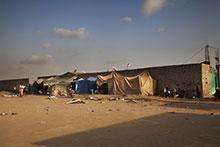Authorities Free More Than 1,600 Ethiopian and Somali Migrants
Authorities in Yemen have freed more than a thousand Somali and Ethiopian migrants, many suffering from torture and sexual abuse while forcibly held by human smugglers.

Yemen 2013 © Anna Surinyach
Many migrants pass through Haradh town on their way to Saudi Arabia, whose border is just a few kilometers away.
SANA’A, YEMEN/NEW YORK, MAY 1, 2013—Authorities in Yemen have freed more than one thousand migrants from Somalia and Ethiopia, many suffering from torture and sexual abuse while forcibly held by human smugglers, the international medical humanitarian organization Doctors Without Borders/Médecins Sans Frontières (MSF), which has treated the migrants, said today.
Since April 7, Yemeni authorities have freed 1,620 people held by smugglers in farms in Haradh region in the north of Yemen. Some of the migrants had been held for months and displayed signs of torture and other physical, sexual, and emotional abuse. Some had their fingernails pulled out or their tongues partially cut off. Others had been severely beaten.
“Many of the migrants are physically and mentally exhausted and are suffering from severe mental trauma due to the horrific conditions and treatment they experienced during their detention,” said Angels Mairal, an MSF psychologist in Haradh.
Many of the migrants treated by MSF were suffering from life-threatening diseases, including pneumonia, complicated malaria, and dengue. Most of the migrants referred by MSF to its hospital in Al-Mazraq, located near Haradh town, were victims of human trafficking, forced labor, and slavery. The majority of those receiving psychological support by MSF have reported being tortured. Among the migrants assisted, 62 are children and 142 are women; 71 severely ill people were admitted to the hospital.
Yemen is located along one of the main people smuggling routes from the Horn of Africa to the Gulf States. Many Ethiopian migrants fleeing extreme poverty try to enter Saudi Arabia through Haradh. They often end up in the hands of smugglers who extort money through torture and psychological abuse.
The freed migrants’ medical and humanitarian needs were extensive since some had not eaten for up to seven days before their release by Yemeni authorities. MSF provided some supplementary food rations and also improved sanitary conditions in both Haradh and Amran transit locations.
From Haradh, 800 Ethiopians have been transferred to migrant centers in the capital Sana’a, where they await repatriation; 550 Somalis were transferred to a refugee camp in Aden. However, those locations do not have the capacity and services to adequately assist the inhabitants.
“We are facing an emergency on top of this chronic situation and we are extremely worried about the future of thousands of migrants who are stranded in Yemen generally and in Haradh in particular,” said Tarek Daher, MSF’s head of mission in Yemen. “They are exhausted after so many attempts to cross the border, and without any resources. The majority of them become beggars in the street of Haradh. They try to survive without any decent shelter, sanitation, or regular access to food.”
The Yemeni government has made notable efforts to free, host, and protect the newly liberated migrants in Haradh. This support must continue, along with assistance from the international community.
MSF, together with authorities and some nongovernmental organizations, is expanding its efforts to improve living conditions for the migrants stranded in Haradh and to improve access to health care for those who are released or who are in transit and awaiting repatriation.
MSF has been working in Hajjah governorate in the north of Yemen since 2009. The organization manages the hospital near Al Mazraq, which provides local and displaced people with basic and specialist health care, surgery, and emergency services. Since last year, MSF has been providing mental health assistance for migrants in Haradh town. MSF is also carrying out medical activities in Aden, Ad-Dhale, Abyan, and Amran governorates.




